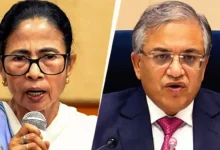
Mumbai: Indian stock markets opened lower on Friday, the second day following U.S. President Donald Trump’s announcement of new tariffs, but displayed notable resilience compared to their Asian counterparts. While global markets, particularly in Asia, faced sharp declines amid fears of a trade war and recession, India’s benchmark indices managed to weather the storm.
The Nifty 50 opened at 23,190.40, down 59.70 points or 0.26 percent, while the BSE Sensex started at 76,160.09, losing 135.27 points or 0.18 percent. This initial dip mirrored global uncertainty, but Indian markets held up better than many expected.
Market analyst Ajay Bagga, speaking to ANI, described the tariffs as a “U.S. Liberation Day” move that severely dented market sentiment. He warned of rising global recession risks due to the potential for a trade war. “U.S. stock markets took the hardest hit from the ‘Make America Wealth Again’ tariffs, which are seen as counterproductive—likely to raise prices, limit choices, and curb demand,” Bagga said. He credited Indian banks and financial stocks for cushioning the blow, helping local markets withstand the downturn seen in Asia, Europe, and the U.S.
Also read: US Tariffs Issue: Know What Centre Tells Rajya Sabha Over Trump’s Tariffs
Looking ahead, investors are focused on India’s earnings season, which kicks off next week and is expected to drive stock movements. Attention is also on the Reserve Bank of India’s (RBI) interest rate decision on April 9, which could further shape market direction. Additionally, a market holiday on April 10 will push the weekly options expiry to Wednesday, making today’s Nifty trading session critical as premium decays are likely to accelerate.
Globally, economic turbulence was evident. The U.S. Dollar Index (DXY) suffered its largest single-day drop since 2005, plunging over 2 percent. Oil prices fell amid concerns of a worldwide slowdown, worsened by OPEC+’s decision to boost production in an already oversupplied market. Commodity markets also felt the strain, with silver tumbling more than 6 percent and copper shedding 3 percent. Fitch Ratings added to the gloom by downgrading China’s sovereign rating to ‘A,’ citing increased government spending and the tariff impact.
In India, sectoral performance on the NSE was mixed. Only pharma and banking stocks opened higher, while others declined. Nifty IT was the hardest hit, falling 1.53 percent, followed by Nifty Metal (-0.76 percent) and Nifty Auto (-0.39 percent). Among Nifty 50 stocks, HDFC Bank, Bajaj Finance, and Zomato led the gainers, while ONGC, Infosys, Hindalco, TCS, and Tata Motors were the top losers.
Asian markets remained under pressure. Japan’s Nikkei 225 plunged over 3 percent, Singapore’s Straits Times Index dropped 3 percent, and South Korea’s KOSPI lost 1.45 percent, reflecting widespread anxiety over the trade war’s economic fallout.
The U.S. markets reacted even more sharply to Trump’s tariff announcement. On Thursday, the S&P 500 nosedived 4.84 percent, and the Nasdaq plummeted 5.97 percent, amplifying fears of an impending recession and the broader consequences of escalating trade tensions.




